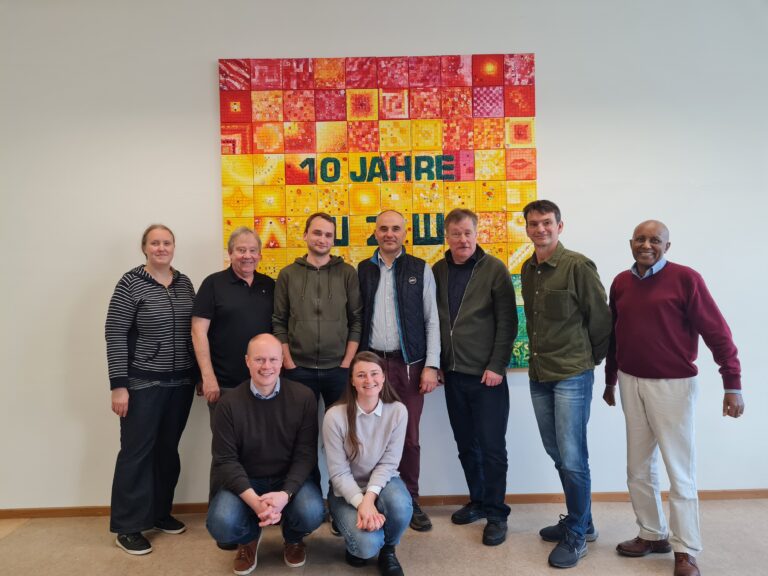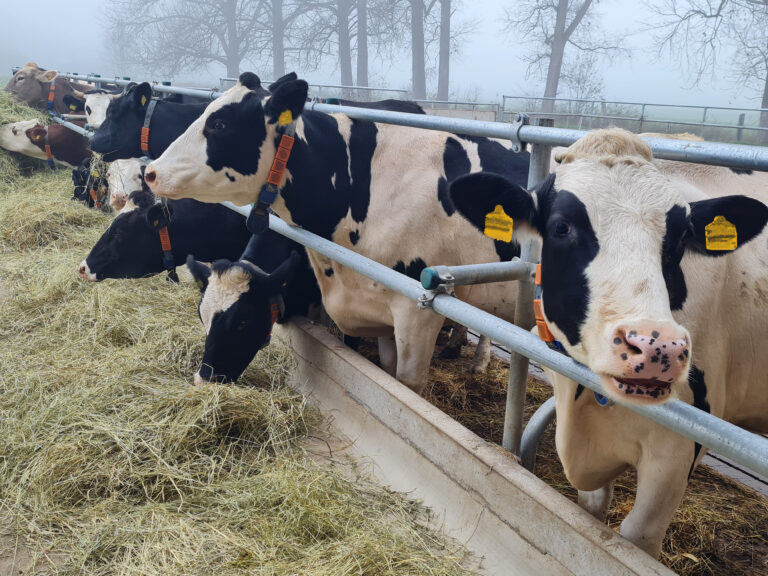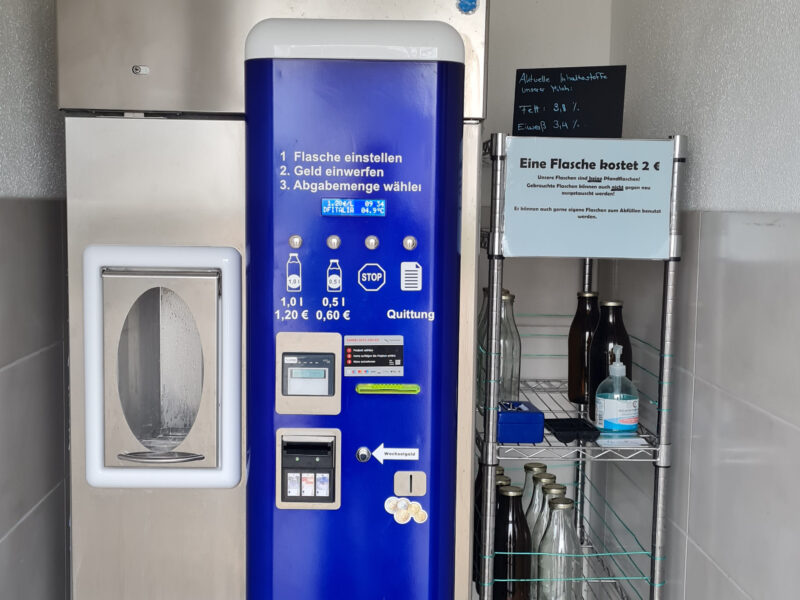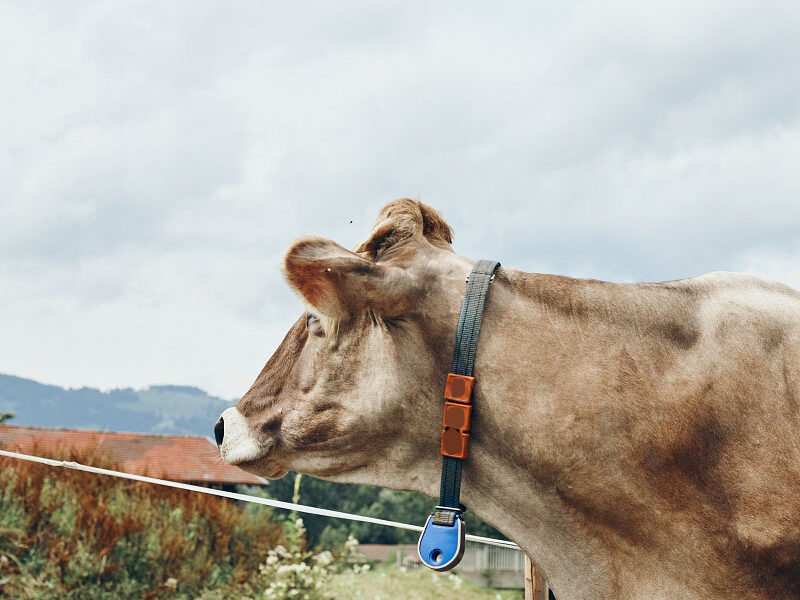SustainIT Newsletter 1/2023
Dear readers,
We are two-thirds through the project SustainIT. A lot of data and information has been collected, analysed and discussed with various beef and milk value chain stakeholders in Germany, Sweden, Finland and Estonia, and several exciting topics are coming up in the last year of the project. In the second half of 2022, the consumer survey results were discussed in the Living Labs. Partners planned and prepared approach for interviews on data initiatives, public sector data usage and collaboration with Digital Innovation Hubs in each country. Also, methodology for the upcoming activities related to ICT use and business model innovation has been in the making.
In September 2022, SustainIT partners Estonian University of Life Sciences and Technical University of Munich participated in ICT-AGRI-FOOD midterm seminar in Aachen, Germany and introduced the project and its progress to consortiums of other projects in the same call. Consumer survey results were presented to the agri-food stakeholders in the conference “Digital Shift in Estonian Rural Economy” in September. Estonian partners published a review-paper on the role of public policies in digitalization of agri-food sector.
In November 2022, the partners met for the Project Living Lab at Technical University of Munich to review the progress and specify the plans for the third year of the project. In 2023, a specific focus will be on publishing and dissemination of the knowledge through various channels, cooperation and experiments with Digital Innovation Hubs, collecting data on ICT use in the enterprises and co-creating innovations in the business models related to animal health and welfare data and digitalization. The project partners in cooperation with the ClearFarm project will organize a session “Releasing the potential of ICT for sustainable cattle value chains” during the 51th annual conference of the Swiss Society for Agricultural Economics and Agricultural Sociology in April 2023 in Lindau Switzerland. The conference topic is “Transformation of agri-food systems – sustainability and digitalization of food value chains” and it provides an opportunity to introduce the SustainIT results to scientific audience.
With best regards,
Dr. Ants-Hannes Viira
SustainIT coordinator
SustainIT progress
Country Living Labs discussed the consumer survey results with beef and milk value chain stakeholders
SustainIT Living Labs provide an opportunity for various actors to directly engage, network and co-learn. The Country Living Labs (CLL) discussed the results of the SustainIT consumer survey that collected data on public opinion on the animal health and welfare issues, dietary and food consumptions habits, animal welfare labels on food products, ICT use and information sources. Each CLL focused mainly on their national results, but the questionnaire survey provided material for comparisons of countries also.
Consumers willingness to pay more for products that meet higher animal welfare standards: SustainIT consumer survey showed that almost half of Estonian consumers were not ready to pay more, in Germany their share was a third, while in Finland just 15%.
One issue that came up in several CLLs was the behaviour of consumers in terms of paying more for products that meet higher animal welfare standards. Estonian meat industry actors discussed their experience that the Estonian consumers are very price sensitive and the price will remain the most critical factor at least in the short term. Therefore, price premium from the animal welfare label may be hard to achieve. The same problem was discussed in the Finnish CLL where the question whether the consumers would be really willing to pay more for those products remained open.
CLLs raised the concern that consumers have a very limited understanding on modern farming practices and animal health and welfare. One of the most important aspects for consumers is that no pain or suffering is caused to the animals, but they struggled with evaluating other aspects related to animal welfare. The consumers did not associate their purchasing choices with actual animal health and welfare situation as the results showed that consumers gave the lowest scores to themselves in the question about which actors are responsible for animal health and welfare. The farmers were seen as carrying most responsibility on animal welfare and health issues.
Consumers indicated that they do not have enough information on animal health and welfare questions. The discussion in CLLs demonstrated that the value chain stakeholders have to be proactive in providing information and educating the consumers about modern farming practices and animal welfare. Otherwise, the public opinion will be formed by animal welfare scandals and views of animal welfare activists. Communication channels, e.g. social media, may voice very limited and sensational information but nevertheless may have a disproportionate effect in shaping public opinion.
Project Living Lab in Munich, Germany
On 1-2 November, SustainIT consortium met for the Project Living Lab (PPL) at the Chair of Agricultural Production and Resource Economics at Technical University of Munich (TUM). The aim of PLL was to provide a framework and methodology for the upcoming Country Living Lab meetings and to monitor the progress of activities. As the project is half way through, PLL meeting concentrated on what activities have been conducted and what kind of corrections are needed for the second half of the project. Data that has been collected so far:- Existing databases, their coverage, stakeholders, data availability and collection technologies.
- Barriers and challenges for data exchange across the dairy and beef value chain.
- Consumer survey on interest towards animal welfare and health data, ICT usage.
- Data initiatives and Digital Innovation Hubs.
- Publication and dissemination of the project results.
- Collection and analysis of data on ICT use in enterprises.
- Business model innovation.
- Review on the state of the art of animal health and welfare related data initiatives in the project countries.
- Digital innovation challenge experiment with national Digital Innovation Hubs.
- Elaboration of recommendations for public sector and policy makers.

Figure 1. SustainIT team at the Chair of Agricultural Production and Resource Economics at Technical University of Munich
The PLL meeting provided an opportunity for field trips in which value chain stakeholders shared their experience and challenges at first hand. The partners visited a dairy farm and the Bavarian State Research Centre for Agriculture.

Figure 2. Cows at an outdoor feeding table at Grandl’s family farm
Mr. Grandl’s family farm
Mr. Grandl’s family farm is an organic farm located outside Munich and is part of the organic farming association Naturland. The farm has an automatic milk dispenser on site (Grandl’s Milchtankstelle) that is open for 24 hours a day, and is promoted on Social Media. In 2022, the farm received the Bavarian animal welfare prize acknowledging the effort the family has put into the cows’ living conditions and wellbeing in their living environment. The construction of the new barn enables a closed system with generous amount of space, free runs, pasture grazing, high lying comfort, natural light and the nurse cow husbandry. The Grandl’s’ want to raise and market their animals themselves to avoid long transportation times and surrounding changes.

Figure 3. Automatic milk dispenser at Grandl’s family farm

The Digimilch project
DigiMilch project is implemented in the Bavarian State Research Centre for Agriculture and deals with all areas of the milk production process chain. The aim is to test existing digital solutions from the field to the barn identify existing gaps or deficits in smart solutions and transfer this knowledge to farms, companies and organisations. More specifically the demonstration projects concern management of agricultural fertilizer, sensor-based yield determination, feeding management, interconnected barn technology and interconnected animal sensor systems. In addition, DigiMilch functions as a catalyser for knowledge transfer between commercial dairy farms, software and machine companies and research. The Bavarian State Research Centre for Agriculture is under the governance of Bavarian State Ministry for Food, Agriculture and Forestry. The research centre consists of nine institutes that carry out applied and multidisciplinary research and knowledge exchange.

Figure 4. A cow at Bavarian State Research Centre for Agriculture
For more information:
Digimilch. https://www.lfl.bayern.de/digimilch
Public sector interactions
WP4 of the project focuses on the public sector’s role in digitalization and in the creation of innovation ecosystem. In November 2022, SustainIT Estonian partners published a systematic review on the role of public policies in the digitalization of agri-food sector (Kukk et al 2022). The paper focused on three main questions: 1) what are the justifications for policy interventions related to digitalization in agri-food sector? 2) what should be done with policy interventions? and 3) how the policies should be carried out? The methodological approach was based on systematic review of academic peer-reviewed papers on Scopus and Web of Science database. 47 papers addressing digitalization in agri-food sector and public policies remained in the analysis based on the criteria set for the search. The publication dates of the literature demonstrates that the digitalization issues in agriculture have become prominent research topics in the last few years in particular, as over 80% of papers in the analysis were published in 2018─2020.
The review results indicate that there are two main roles of public policies in digitalization of the agri-food sector. The first role of policies is to protect public interests and weaker parties such as farmers and value chain stakeholders, who have limited bargaining power. The second role is to be receptive to the opportunities and enable to innovation to develop and deploy new technologies.
The main justification for intervention in case of protecting the weaker parties is the risk of imbalanced progress in the form of increased digital divide between stakeholders in adoption of technologies, access to benefits of digitalization or damaging effects of some technologies. The policy interventions focus on enhancing data quality, integrity and availability to different parties; sustainable adoption of new technologies, incl. open data solutions and simple and practical technologies. The policy interventions are mainly carried out in form of trying to develop balanced policies, where benefits for and interests of various actors are considered. But also, by effective dissemination of information and knowledge that should facilitate fair digitalization and by establishing dialogue between the various stakeholders.
The justification for the other role of public policies in enabling innovation lies in the risks related to lack of infrastructure and data regulation that are considerable barriers for digitalization. Another motive is the threat of missing the opportunity to improve the agri-food sector’s competitiveness. The process of interventions should be reformed through policies. The literature demonstrated that the main ways for implementing the policy interventions should be development of cross-cutting concepts (e.g., mission-oriented innovation policies, innovation ecosystems thinking etc.), and tailoring the polices based on the maturity level of the innovation.
The two roles discussed in the paper are intertwined and should help to avoid excessive power asymmetries in the agri-food value chain. Important aspect is the protection of weaker parties, while not compromising the innovation potential.
For more information :Kukk, M., Põder, A., Viira, A-H. (2022). The role of public policies in the digitalisation of the agri-food sector. A systematic review. NJAS Impact in Agricultural and Life Sciences, 94 (1), 217−248. DOI: 10.1080/27685241.2022.2147870.

Estonian partners discussed the consumers role and animal welfare labelling in the conference „Digital Shift in Estonian Rural Economy“
The Estonian Chamber of Agriculture and Commerce has acknowledged digitalization as one of the key trends that will affecting the development of the sector and organises an annual conference on digitalization trends. In 2022, the conference took place in the end of September and brought together representatives from agricultural sector, academia, public sector, farm technology and ICT providers. The topics covered included big data in agriculture, consumers readiness for ICT use, remote sensing, electronic field diary, data management and sharing in agricultural machinery, digitalization trends in animal husbandry, smart digital solutions in practice. Estonian partners’ presentation “Consumers’ interest in animal welfare and health information and digitalization related challenges” used the SustainIT consumer survey results to discuss the dietary preferences, factors that impact purchasing decisions, consumers’ understanding on what are animal health and welfare, and who is responsible for it, willingness to pay for higher animal welfare and how relevant is the topic for consumers. For more information: Viira, A-H., Kukk, M., Tamm, H., Põder, A. (2022). Tarbijate huvi loomaheaolu ja terviseinfo vastu ja digitaliseerimise väljakutsed. https://epkk.ee/wp-content/uploads/2021/09/Ants_Hannes_Viira_ettekanne_digipoore.pdfL
- On 20-21 April 2023, 51th annual conference of the Swiss Society for Agricultural Economics and Agricultural Sociology (SGA) «Transformation of agri-food systems – sustainability and digitalization of food value chains» will take place in Lindau, Switzerland. The conference will provide opportunity to present scientific findings and practical exercises related to digitalization of value chains and related economic, social and political challenges. SustainIT team, in cooperation with the ClearFarm project will organise a session “Releasing the potential of ICT for sustainable cattle value chains” in the conference and will participate with presentations on digital information sharing in current databases, on consumer response on ICT adoption, and on implementation of multi-actor Living Lab approach.
- On 27th January 2023, the Finnish partner University of Oulu will be one of the organisers of a seminar & webinar taking place in agricultural fair Sarkamessut in Seinäjoki, Finland. There will be also a talk introducing SustainIT results obtained when animal health data collection and databases in partner countries were analysed and compared.
- ERA-Net SusCrop has announced on video contents “What sustainable crop production means to you?” The contest is open to everybody with the aim to activate various groups such as school children, students, scientists, farmers and any other group or enthusiasts. The videos should be between 90 seconds and 3 minutes in length. The registration and video submission are open until May 26th, 2023.
Spotlight on project partners
Estonian Dairy Cluster
Estonian Dairy Cluster (EDC) was established in 2015 as a non-profit association of entrepreneurs that brings together various milk value chain stakeholders. EDC looks 10 years ahead and develops strategies and new technologies for dairy sector.
Estonian Dairy Cluster has three specific aims:
- to find new opportunities for creating higher value added for dairy producers and processing chain,
- to improve economic performance of enterprises in dairy sector,
- to increase global competitiveness through cooperation and various innovation activities.
Estonian Dairy Cluster has 23 members and strong collaboration network of research institutions.
6 main pillars of EDC’s activity are: heard health, milk quality, feeding, breeding, export and digitalization. More details about development activities to be found at EDC’s website https://piimaklaster.ee/en/home/
In coming years practical aspects of digitization will be in the focus of EDC. Dairy value chain has been subject to rapid technological and economic changes, and new societal pressures due to their greenhouse gas emissions, increasing concerns about antimicrobial resistance and animal welfare, and changing diets of consumers. Several EDC’s earlier activities will get extra layer of use by new digital solutions and wider implementation of information and communication technologies.
Since it was established, EDC has followed the principles of the European Innovation Partnership (EIP), which is also included in the association’s statutes. The EIP working group led by the EDC consists of non-profit association Estonian Dairy Cluster with its members and research partners such as TorroSen OÜ, Estonian University of Life Sciences, Tervisetehnoloogiate Arenduskeskus AS, Animal Breeders´ Association of Estonia and Eesti Põllumajandusloomade Jõudluskontrolli AS. It registered itself as an EIP working group at the end of 2017.
EDC engages in cross-border cooperation with the EIP working group led by the University of Oulu, Finland, in its capacity as the lead partner in EIP cooperation. This is the first time that European Innovation Partnership working groups have worked together across borders. Cooperation projects on the Estonian side are express mastitis test MAVAS development, heard management program prototype development beefEST, automatic bovine health data system WISECOW and on the Finnish side projects SMARTFEED, and GOOD FOR CATTLE.
Fruitful cooperation between EIP groups has led to wider cross-border cooperation and brought together partners and ideas of SustainIT project.
In the SustainIT project, Estonian Dairy Cluster brings valuable experience from the dairy sector and networks with various value chain stakeholders. The overall goal is to support the value chain stakeholders in achieving higher value added and improved economic performance through digitalization through improved understanding the economic, technical, political and social challenges and opportunities related to the ICT use and data exchange.
EDC team members in the SustainIT project are Dr. Anne Põder and Mr. Hardi Tamm.


Newsletter editor and contact
Anne Põder, Estonian Dairy Cluster anne.poder@piimaklaster.ee
More information from: www.sustainit.ee
News in: LinkedIn
Funding
The SustainIT project has received funding from national funding agencies in Estonia, Finland, Sweden, Germany, in the framework of the ERA-NET Cofund ICT-AGRI-FOOD 2019 Joint Call (European Union’s Horizon 2020 research and innovation programme grant agreement no 862665).
The national funding bodies of the partners are:
- Ministry of Rural Affairs (Estonian University of Life Sciences)
- Ministry of Agriculture and Forestry (University of Oulu)
- The Swedish Research Council for Sustainable Development (Halmstad University)
- Estonian Research Council (Estonia Dairy Cluster)
- Federal Ministry of Food and Agriculture (Technical University of Munich)

